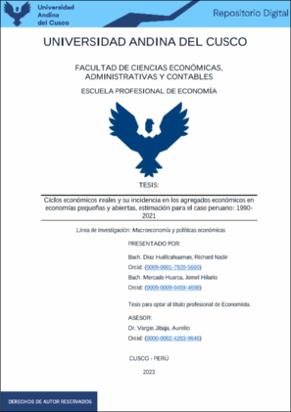| dc.contributor.advisor | Vargas Jibaja, Aurelio | |
| dc.contributor.author | Diaz Huillcahuaman, Richard Nadir | |
| dc.contributor.author | Mercado Huarca, Jomel Hilario | |
| dc.date.accessioned | 2024-03-04T21:09:48Z | |
| dc.date.available | 2024-03-04T21:09:48Z | |
| dc.date.issued | 2023-10-04 | |
| dc.identifier.uri | https://hdl.handle.net/20.500.12557/6098 | |
| dc.description.abstract | La teoría de los ciclos económicos reales (RBC) postula que las fluctuaciones económicas
son impulsadas principalmente por shocks tecnológicos que afectan la productividad de las
empresas, más que por cambios en la política monetaria o fiscal. Esta teoría ha cobrado
protagonismo en las últimas décadas y se ha aplicado para estudiar el impacto de diversos
shocks económicos en economías pequeñas y abiertas. En este contexto, la presente
investigación tiene como objetivo estudiar cómo los ciclos económicos reales afectan a los
agregados macroeconómicos en Perú para el período 1990-2021. La investigación sigue un
enfoque cuantitativo, es no-experimental y longitudinal de tendencia y tiene un alcance
descriptivo-correlacional. El análisis incluye la estimación de un modelo RBC estructural
calibrado para la economía peruana que permite diferenciar entre shocks transitorios y
shocks de tendencia. En los resultados se han identificado efectos directos para el PBI,
Consumo, Exportaciones netas e Inversión. En general, vemos que los shocks a la tendencia
generan efectos positivos en períodos de largo plazo. En particular, observamos cambios
positivos en el producto, exportaciones e inversión para los últimos 10 períodos, estos
cambios se registran entre 0.04% para la inversión y 0.12% para las exportaciones. Para el
caso del consumo, observamos un impacto negativo a largo plazo, lo que sugiere una mayor
propensión al ahorro en la economía peruana. | es_PE |
| dc.description.abstract | The theory of real business cycles (RBC) postulates that economic fluctuations are mainly
driven by technological shocks that arise from the productivity of firms, rather than by
changes in monetary or fiscal policy. This theory has gained prominence in recent decades
and has been applied to study the impact of various economic shocks in small, open
economies. In this context, the present research aims to study how the real economic cycles
arise in the macroeconomic aggregates in Peru for the period 1990-2021. The research
follows a quantitative approach, is non-experimental and has a longitudinal trend and has a
descriptive-correlational scope. The analysis includes the estimation of a structural RBC
model calibrated for the Peruvian economy that allows differentiating between transitory
shocks and trend shocks. The results have identified direct effects for GDP, Consumption,
Net Exports and Investment. In general, we see that shocks to the trend generate positive
effects in long-term periods. In particular, we observe positive changes in the product,
exports and investment for the last 10 periods, these changes are registered between 0.04%
for investment and 0.12% for exports. In the case of consumption, we observe a negative
long-term impact, which suggests a greater propensity to save in the Peruvian economy. | en_US |
| dc.format | application/pdf | es_PE |
| dc.language.iso | spa | es_PE |
| dc.publisher | Universidad Andina del Cusco | es_PE |
| dc.rights | info:eu-repo/semantics/openAccess | es_PE |
| dc.rights.uri | https://creativecommons.org/licenses/by-nc-nd/4.0/ | es_PE |
| dc.subject | Ciclos económicos reales | es_PE |
| dc.subject | Productividad | es_PE |
| dc.subject | Agregados económicos | es_PE |
| dc.subject | Estimación estructural | es_PE |
| dc.title | Ciclos económicos reales y su incidencia en los agregados económicos en economías pequeñas y abiertas, estimación para el caso peruano: 1990-2021 | es_PE |
| dc.type | info:eu-repo/semantics/bachelorThesis | es_PE |
| thesis.degree.name | Economista | es_PE |
| thesis.degree.grantor | Universidad Andina del Cusco. Facultad de Ciencias Económicas, Administrativas y Contables | es_PE |
| thesis.degree.discipline | Economía | es_PE |
| dc.publisher.country | PE | es_PE |
| dc.subject.ocde | https://purl.org/pe-repo/ocde/ford#5.02.04 | es_PE |
| renati.advisor.dni | 23938021 | |
| renati.advisor.orcid | https://orcid.org/0000-0002-4203-9646 | es_PE |
| renati.author.dni | 70468519 | |
| renati.author.dni | 72184522 | |
| renati.discipline | 311016 | es_PE |
| renati.juror | Florez Lucana, Ignacio Ramiro | |
| renati.juror | Castro Ponce De León, Ricardo | |
| renati.juror | Quispe Palomino, Alberto | |
| renati.juror | Palacio Mamani, Carlos Eduardo | |
| renati.level | https://purl.org/pe-repo/renati/level#tituloProfesional | es_PE |
| renati.type | https://purl.org/pe-repo/renati/type#tesis | es_PE |
| dc.description.lineadeinvestigacion | Macroeconomía y políticas económicas | es_PE |




